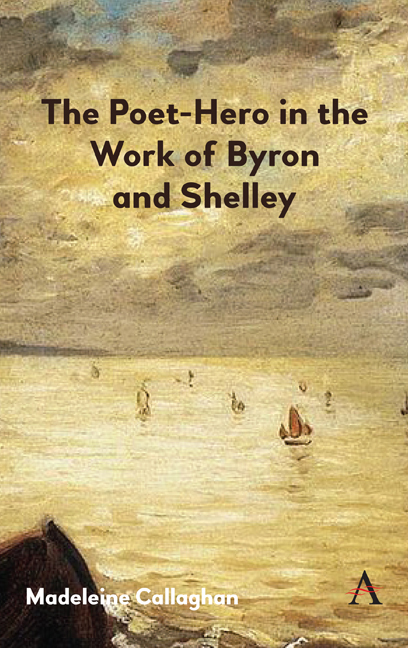Book contents
- Frontmatter
- Dedication
- Contents
- Acknowledgements
- Note on Texts and Abbreviations
- Introduction: The Poet-Hero: ‘Who shall trace the void?’
- Part I Byron
- Interchapter
- Part II Shelley
- Chapter Six ‘The Highest Idealism of Passion and of Power’: Shelley's Heroic Poetics in A Defence of Poetry, The Mask of Anarchy and Prometheus Unbound
- Chapter Seven ‘Holy and Heroic Verse’: The Revolutionary Poet-Heroes of Laon and Cythna
- Chapter Eight ‘This soul out of my soul’: The Trial of the Poet-Hero in Shelley's Epipsychidion
- Chapter Nine ‘His mute voice’: The Two Heroes of Adonais
- Conclusion The Byronic and the Shelleyan Poet-Hero
- Bibliography
- Index
Chapter Seven - ‘Holy and Heroic Verse’: The Revolutionary Poet-Heroes of Laon and Cythna
from Part II - Shelley
Published online by Cambridge University Press: 30 March 2019
- Frontmatter
- Dedication
- Contents
- Acknowledgements
- Note on Texts and Abbreviations
- Introduction: The Poet-Hero: ‘Who shall trace the void?’
- Part I Byron
- Interchapter
- Part II Shelley
- Chapter Six ‘The Highest Idealism of Passion and of Power’: Shelley's Heroic Poetics in A Defence of Poetry, The Mask of Anarchy and Prometheus Unbound
- Chapter Seven ‘Holy and Heroic Verse’: The Revolutionary Poet-Heroes of Laon and Cythna
- Chapter Eight ‘This soul out of my soul’: The Trial of the Poet-Hero in Shelley's Epipsychidion
- Chapter Nine ‘His mute voice’: The Two Heroes of Adonais
- Conclusion The Byronic and the Shelleyan Poet-Hero
- Bibliography
- Index
Summary
Laon and Cythna; or the Revolution of the Golden City: A Vision of the Nineteenth Century in the Stanza of Spenser, Shelley's ‘symbolic romance-epic’, exemplifies his early sophisticated understanding of the possibilities of poetic heroism. Laon and Cythna, in their revolutionary political activism, are designated as heroic, and theirs is a heroism forged from their status as poets as they display a typically Shelleyan resistance to the unreflective acceptance of traditional values. Yet Shelley, as aspirant to the status of epic poet, becomes equally engaged in heroic activity as he seeks to create a blueprint for the poet-hero. Previous discussions of Shelley's poetry have often bemoaned Laon and Cythna's perceived shortcomings or ignored it all together, with Brian Wilkie pithily referring to it as ‘the orphan of Shelley criticism’. Other criticism has focused on its gender representation and historical contexts, but this chapter focuses on how Shelley carefully renders his revolutionary poet-heroes as exemplars of what the poet could and should be before his reader. Laon and Cythna traces the development of the poet as hero, as Laon, and then Cythna, come to represent ideal poet-heroes in their creation of their readership and development of aesthetic and moral authority. Shelley's self-imposed epic task became to create prototypes of poet-heroes, poet-heroes who are agents of social change effected through the aesthetic beauty of language. Like The Prelude, Laon and Cythna is no early poetic experiment to be dismissed in favour of Shelley's later works. The growth of Shelley's mind and its primary meditations on to the power and potential of the poet are contained within its scope as Shelley defines how the poet-hero can develop his powers and to what end. The didactic drive of Laon and Cythna is not, as is often supposed, aimed only at educating or persuading the reader. Shelley's epic is the testing ground of the poet's self-education where he explores the role and duties of the poet-hero and his/ her relationship with the reader. Shelley's poem is aimed as much at himself as it is at its reader.
- Type
- Chapter
- Information
- The Poet-Hero in the Work of Byron and Shelley , pp. 147 - 168Publisher: Anthem PressPrint publication year: 2019

